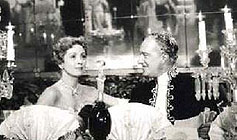|
|
|
|
Madame
de ...
|
 |
|
Few films establish so much, so quickly, on so many levels, with such stunning economy as Max Ophüls' sublime Madame de ... . Louise (Danielle Darrieux) is 'Madame de ...' because she is anonymous, typical of her privileged class; it is only the earrings we see in the opening frames – which are about to be pawned – that precipitate her into a drama. And as those earrings are moved, so does the camera move, finally revealing Louise in a mirror, amidst all her material possessions. From that moment on, Ophüls will not let us overlook, for a single second, the underpinnings of this wealthy world: the flows of money and debt; the endless rituals of servants opening doors; the etiquette of preparation before any public appearance. Even the journey from bedroom to front door is, in this film, an elegant sociological exposé. After home and the pawnshop, there is the church (site of bourgeois hypocrisy) and the opera, where all is show; there we will meet Louise's husband, André (Charles Boyer), 'debonair' as long as he can control the affairs (both his own and hers) that define this 'sophisticated' marriage. By the time that the earrings have come back into André's hands a second and third time – and Louise has fallen dangerously in love with Donati (Vittorio De Sica) – what could have easily been a cute conceit (the earrings linking all the characters, reminiscent of Ophüls' La Ronde [1950]) ultimately comes to articulate all the fine, crucial distinctions of the story and its themes. For Louise, who lives in a state of denial about the conditions that enable her supposed freedom ("I know little about reason"), the earrings are a token of her love with Donati; for André, they are a sign of possession, of the patriarchal, military and aristocratic power he wields over other people's destinies. Madame de ... is, by turns, brittle, brutal, compassionate and moving. Ophüls delineates this world with almost Brechtian precision, yet does not discount the strength or significance of stifled, individual yearnings. Even as the characters writhe in their metaphoric prisons or shut these traps on each other, their passions touch us: supremely, when André closes the windows on Louise like a jailer as he feebly declares, half whispering in secret: "I love you". MORE Ophüls: Letter From an Unknown Woman © Adrian Martin March 2003 |
![]()